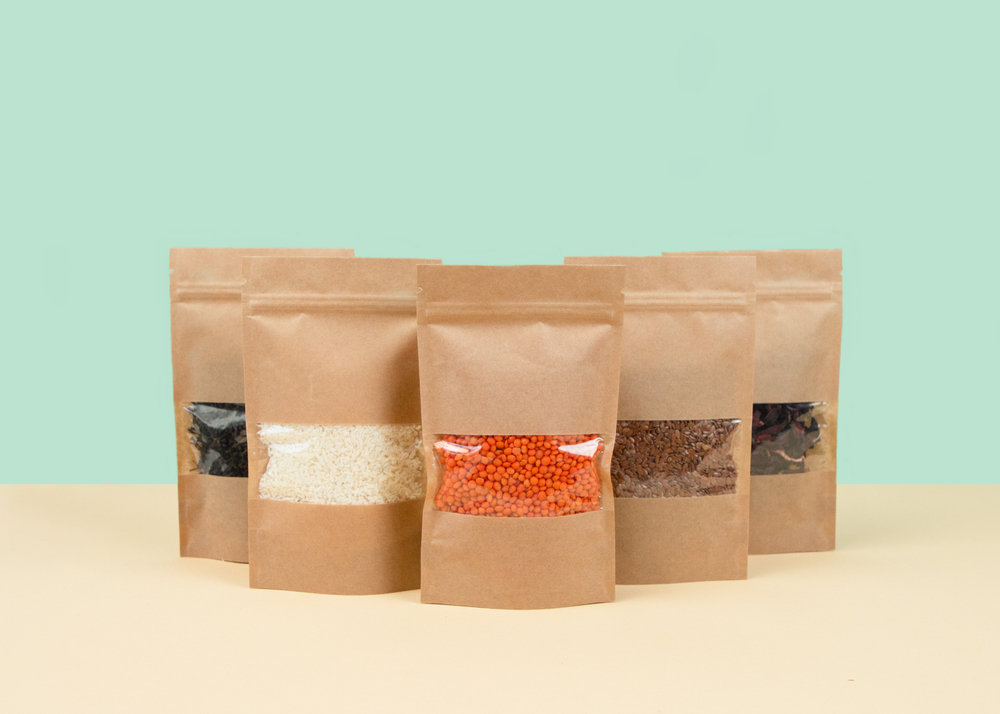In this article, the digital label experts at United Label are going to look at a common type of packaging for many products: flexible packaging. We’ll also look at the types of labels used for flexible packaging, such as pressure-sensitive labels and digital printed labels.
So What Is Flexible Packaging, Anyway?
Flexible packaging refers to packaging materials that can be easily molded or shaped to fit the product being packaged. It typically involves the use of materials such as plastic films, paper, aluminum foil, and other materials that can be laminated together to create a barrier against moisture, oxygen, and other factors that could affect the quality and shelf life of the product.
Flexible packaging is used in a wide range of applications, including food and beverage packaging, pharmaceuticals, personal care products, and other consumer goods. It offers a number of advantages over traditional packaging materials, such as lower cost, lighter weight, and greater flexibility in design and shape.
Flexible packaging can take many forms, including pouches, bags, sachets, and wrappers. It is often used for products that require a high degree of protection, such as food products that need to be kept fresh and free from contamination.
What Kinds of Products Use Flexible Packaging?
Flexible packaging is used in a wide range of products across different industries. Some examples of products that use flexible packaging include:
- Food and Beverage Products: Snacks, chips, cookies, candies, pet food, coffee, tea, juices, and soft drinks are all commonly packaged in flexible packaging.
- Personal Care Products: Shampoo, conditioner, body wash, lotion, cosmetics, and other personal care products are often packaged in flexible packaging to keep them fresh and protected.
- Pharmaceuticals: Flexible packaging is used to package a wide range of pharmaceutical products, including pills, capsules, and tablets.
- Household Products: Cleaning products, laundry detergent, and other household products are often packaged in flexible packaging due to its durability and resistance to moisture.
- Pet Products: Pet food, treats, and other pet products are often packaged in flexible packaging, as it helps to keep the products fresh and protected from moisture.
- Agricultural Products: Seeds, fertilizers, and other agricultural products are often packaged in flexible packaging due to its durability and resistance to moisture.
- Industrial Products: Flexible packaging is used to package a wide range of industrial products, including adhesives, lubricants, and chemicals.
In general, flexible packaging is chosen for its ability to protect products from external factors such as moisture, air, and light, while also providing convenience and ease of use for consumers.
Flexible Packaging and Labels
So now that you know all about flexible packaging, it’s time to discuss the ever-important label, as that is the thing that will provide your customer the information about what’s inside the packaging, and many times draw their interest in your product to begin with!
What Kinds of Labels Go On Flexible Packaging?
There are several types of labels that can be used on flexible packaging, depending on the specific needs and requirements of the product being packaged. Here are some examples:
- Pressure-sensitive labels: These labels are made from a variety of materials, including paper, plastic, and film. They are called “pressure-sensitive” because they adhere to the packaging surface when pressure is applied.
- Shrink sleeve labels: These labels are made from a heat-shrinkable plastic material and are placed over the packaging before being heated, causing them to shrink and conform to the shape of the packaging.
- Wraparound labels: These labels are made from paper or film and are wrapped around the entire surface of the packaging.
- In-mold labels: These labels are printed directly on the packaging material during the manufacturing process, creating a seamless label that is integrated with the packaging itself.
- Stretch sleeve labels: These labels are similar to shrink sleeve labels, but are made from a stretchable plastic material that conforms to the shape of the packaging without the need for heat.
The choice of label will depend on factors such as the type of product being packaged, the printing technology used, and the desired look and feel of the label.
Can Digital Printing Be Used For Flexible Packaging?
Yes! Digital printing can definitely be used for flexible packaging, and often is. In fact, digital printing technology has revolutionized the way that packaging is produced, allowing for shorter print runs, greater flexibility in design, and faster turnaround times.
Digital printing for flexible packaging typically involves the use of a digital printing press, which uses inkjet or electrophotographic technology to print directly onto the packaging material. The digital press can print a wide range of colors and designs, including high-quality photographic images and intricate graphics.
One of the key benefits of digital printing for flexible packaging is that it allows for variable data printing, which means that different designs and information can be printed on each package. This is particularly useful for products that require personalized packaging, such as food and beverage products with different flavors or ingredients.
Digital printing is also more environmentally friendly than traditional printing methods, as it uses less ink and generates less waste. It can also be more cost-effective for short print runs, as there is no need to create printing plates or other expensive setup costs.
Look To United Label for All Your Digital Label Printing Needs
We at United Label support tons of different products and packaging, in all kinds of categories in the marketplace. We operate both flexographic and digital label presses as a custom label printer, and our presses allow for printing labels up to six colors with laminate, varnish and inline die cuts as well as full color digital. Even with conventional flexographic presses, we make our own plates and negatives in our factory which allows for greater control and faster development of custom labels.
Give us a call at 973.589.6500 to see how we can help with your next project, or fill out the information contact form to the right!
